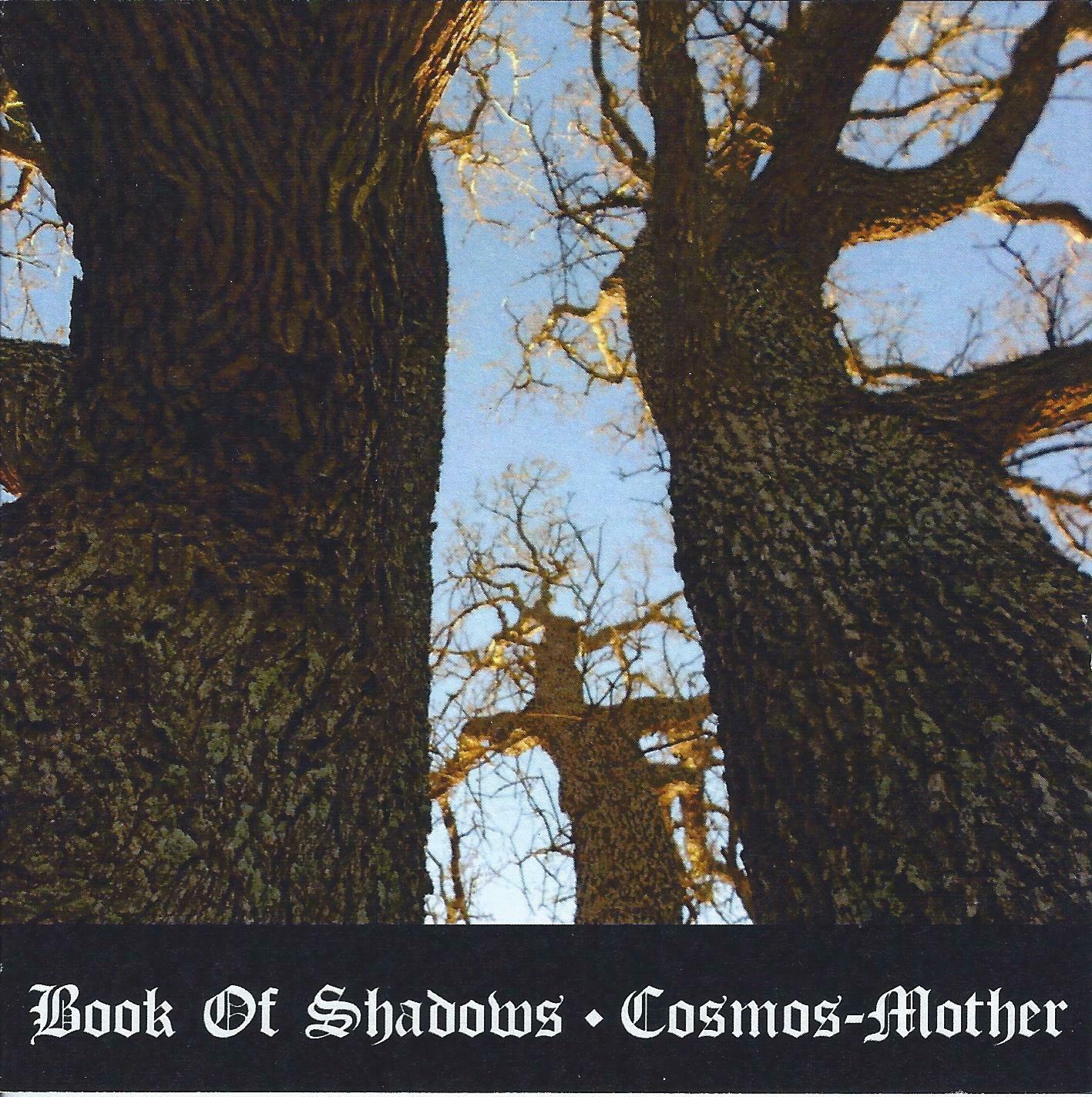 Book Of Shadows – “Cosmos-Mother” (Instincto Records 212, INO-049)
Book Of Shadows – “Cosmos-Mother” (Instincto Records 212, INO-049)
I’ve reviewed nearly 20 albums by Austin, Texas based Book Of Shadows over the past decade and I must say they’re one of the more enjoyable bands to review because they are so confoundedly difficult and, consequently, fun to write about. I’ve always avoided attaching any labels to these folks because they incorporate so many different genres, elements, etc into their music. It’s space-ambient, psychedelic, avant-garde, industrial, sound exploratory, and Book Of Shadows nearly always seamlessly fuse the various elements they’re working with.
On their latest effort – Cosmos-Mother – Book Of Shadows serve up 11 tracks, each including between 3-6 musicians, with the constants being founders Carlton and Sharon Crutcher (AI readers may remember Carlton as a founding member of ST37). The set opens with Moon Pie, a wild mash of machine shop aggression, Sharon’s ethereal space chants, guitar effects, and trippy recorder soloing, and a bit of harmonica at the end. Your Reflection and Alchemist seem to occupy some ambient-space-industrial realm, with a great combination of effects, noise and floating space, and the former being held down by a hypnotic repetitive bass line. Stardust Faded is a dark, slightly orchestral, hallucinatory piece with a bit of psychedelic Morricone spaghetti western theme. Spider Jones features slowly strumming acoustic guitar, electric guitar, and Sharon’s vocals. As the music progresses the acoustic guitar takes some interesting detours, and windswept electronic effects are introduced, which get increasingly spacey and freaky, making for some pretty wild contrasting elements that somehow go together pefectly. Pendulum is possibly the only Sharon-less Book Of Shadows track I’ve heard. It’s got FOUR guitarists (plus Carlton on keys), though you wouldn’t know it just by listening. It’s surprisingly sparse and subtle, with much of what they’re focusing on being ambience and soundscape creation. Flora and Fauna has a beautiful light melody, and I thought the underlying freaky alien electronics and light percussion were a nice touch. Crickets And Tree Frogs is one of the most sound-experimental tracks of the set and made me feel like I was in a schizophrenic mixture of planetarium and nature preserve.
My two hands down favorites of the set were Falling Star and Skycycle The Stratosphere. The 21 minute Falling Star opens with a spaced out barren planet ambience, anguished, whining guitar licks, and atmospheric vocals. After a few minutes Sharon delivers a cosmic narrative. Taken as a whole, this is a killer combination of avant-soundtrack space ambience and mind-bending psychedelic drift. I was surprised to see this was created by just a trio version of Book Of Shadows – Sharon, Carlton on keys, and Jason Zenmoth on guitar, bass and electronics. Sharon returns to the narrative periodically and I think this is one of the few examples of extended text on a Book Of Shadows piece. In summary, this is 21 minutes of seriously image inducing cosmic beauty. The 11 minute Skycycle The Stratosphere starts off with the sound of pouring rain, a dark symphonic rumble, and Sharon’s ghostly space chants. Aaron Bennack’s guitar at times reminds me of Dave Gilmour, and combined with the atmospherics brings to mind a spaced out avant-twisted take on Shine On You Crazy Diamond. Another beauty to close your eyes and be swept away with.
After so many reviews I decided it was time to learn more about Book Of Shadows and conducted the following email interview with Carlton and Sharon.
Aural Innovations (AI): Tell me about how Book Of Shadows formed and what kind of discussions went into the kind of music you would be playing.
Carlton: Sharon had a dream about a band named Book of Shadows. I got involved in the Austin underground music scene, as a musician, in 1985 because I was pursuing a spiritual life and I figured cutting edge musicians would be the most open minded about this sort of thing. I loved all the bands and people I was involved with but I gradually realized the punk scene had no interest in spirituality. It was always equated with religion and therefore everything punks were against. I kept my pursuit but had to be very covert about it, even with my bandmates. In my first two bands, Tulum and ST37, I had always compiled tapes of the best improvisations. To me this was the most interesting music we were doing because you didn’t think about it or prepare, you just went off the deep end into psychic musical exploration. It was always fun and something you could never come up with if you had planned it out. When Sharon and I started making Book of Shadows recordings in 1999 our plan was to make recordings of music that people could do magic rituals along with but also make it interesting improvisational music. In 2001 I realized the ST37 people didn’t understand or appreciate our contributions to the band and I felt like ST37 wasn’t able to evolve musically or philosophically so I left.
Sharon: Book of Shadows was formed after a dream I had, where I was told in my dream we should make music to do magic rituals by! I told Carlton about it and we decided to do that. It was very simple music at first, very organic. Then we brought in some friends to play with us just for certain songs, not as part of the band at that point (1999). We never discussed what it was going to sound like, just doing lyrics that were Goddess based and Carlton playing his synth. I was playing some primitive guitar with lots of effects and loops. We just recorded sounds around the house, sounds of nature, and it went from there. We also put out psychic calls for like minded people to be brought to us and it always worked very well.
AI: I’m well acquainted with Carlton’s musical history but know nothing about Sharon beyond Book Of Shadows. Tell me about your background – previous bands, etc.
Sharon: I have no background! So to speak!! All the singing I did was in my head and playing my guitar when I was a kid. Until I was in my forties, my music didn’t begin until I met Carlton. I would sing some with ST37 at practice when we were waiting for people to show up, and I did some backup vocals on a couple of ST37 songs.
AI: I was reading some of my past Book Of Shadows reviews and what strikes me is both the variety of directions you go in from one album to the next (but also within albums), and the difficulty of describing your music. That difficulty is what makes your albums so enjoyable to review, but also makes you somewhat unique. If you forced me to classify Book Of Shadows, I guess I’d have to say “Avant-Space/Ambient-Psych-Experimental”.
Carlton: Yeah, when I’m asked to label our music it’s always something like that! For me, music is art and art is creating something new, so that’s always the goal with Book of Shadows music. We never plan things out though, I just figure that since we’re people with relevant viewpoints the music will naturally come out original, different all the time, but of the moment.
Sharon: Yes, all of that and hopefully magic as well! I like to put things together that wouldn’t normally go together and create a type of alchemy. I like change and I like mysterious possibilities. I like the element of surprise and I hate rules because I always want to break them, in art anyway!
AI: Are Carlton and Sharon the main members or are there others you consider permanent? There are common names that pop up across the albums but the lineup does seem to be somewhat fluid, and even the number of musicians varies. When I was reading my past reviews I saw instances where you had as many as 7 members.
Carlton: Sharon and I are the core members. Aaron Bennack was with us from 2002 but just moved away and Jonathan Horne has played with us since 2004 but is involved in so many projects he’s in and out. For people who’ve played with us in the past I try to keep an open door and we’re starting to get people on second tours of duty with Book of Shadows. We’re always open to new folks, anyone who can understand and likes the music, and able to do it!
Sharon: It’s always Carlton and I. We really are so flexible and undemanding that people flow in and out of Book of Shadows. We don’t practice much, if ever. Book of Shadows is more about being able to reach a certain dimension in a way, without planning what is going to happen there. A musician will either feel it or not and approach us because they feel like they have something to add, from their heart, really. Everyone just has an opportunity to do something from the heart, carte blanche. So really Book of Shadows is a freedom of expression of each individuals heart at that moment. It’s separate but together as a whole, that’s what makes it magical and draws our musical collective to us. I feel it’s that complete freedom that makes people want to play in Book of Shadows. And we musn’t forget to mention Brett Humphrey who’s been with us for a long time.
AI: One of the distinguishing characteristics of your music is Sharon’s vocals, or “voicings”. In my reviews I’ve made reference to Gilli Smyth’s space whispers, though Sharon does have her own sound. Do you consider the vocals the same as any other instrument, and is Sharon improvising the same as the other musicians?
Sharon: Yes, to both questions. The vocals are my instrument of emotion, I don’t always have words to describe so I use my voice to emote what I feel in the context of the music and open my heart and go from there.
Carlton: Sharon’s vocals live are always improvised and I consider them the psychic center of the music that we all play off of.
AI: Is all Book Of Shadows music improvised? How do you approach that in live performance? Is there any discussion or preparation?
Carlton: For recordings Sharon sometimes writes out lyrics and sings in a more traditional way but we try not to have any rules or over think anything we’re doing. For live shows everything is improvised and there is no discussion about what we’re gonna do, just have the right people on stage and go off into musical/magical exploration. We sometimes practice for a show but it’s usually just to hang out or maybe see how new instruments will fit in. In the early days, after we recorded Hanged Man, we played some shows with those songs that were very rehearsed but for me it becomes a matter of utilizing your time and people seem to have less and less of it, so improvisation is the answer.
Sharon: Yes it is, and no, we don’t discuss it! We have this energy we can create that allows us to just manifest as we go.
AI: Have all the albums so far been from live performances, or have there been “studio” recordings too?
Carlton: On every album I list the songs that were “written” by someone, usually Aaron Bennack or Jason Zenmoth. Those are usually songs that they multi-tracked and then Sharon and I overdubbed on and I want those guys to get credit for the music they came up with and recorded on their own. But most of the albums are a combination of live performance recordings, multi-track studio recordings and practice recordings. Since I want all of these varied recordings to make a cohesive album I don’t list all of the various sources of the recordings.
AI: Any news or future activities/events you’d like to share?
Carlton: We’re playing the Witches Ball October 27, which is put on by the Earth Spirit Alliance. Sharon and I joined a coven so we’re more in touch with the Pagan community and they seem to like our music, which is kind of suprising since they didn’t pay much attention to it before.
AI: You mentioned “Future Blondes” and a new vinyl LP. What is Future Blondes? This is the first I heard of that.
Carlton: Future Blondes is Domokos Nula from Houston. He’s played in Rusted Shut for a long time and played in Helios Creed’s band and a zillion different bands/projects. Sharon and I started playing with him around 2008 and we’re part of his Austin version of the band. He also has the Houston band, the San Francisco band, etc. The music is similar to Book of Shadows but also totally different with Domokos playing beats and ominous creepy vocals. And the album is very different from the live band, very dancie but very trippy weird and original.
AI: You also mentioned Sharon working on a solo folk-psych album. Tell me more about that.
Sharon: That’s something very different that I’m doing with a very special mystery guest. It’ll be songs and lyrics that we have written and I hope to finish it soon!!!
Carlton: Reverb Worship, out of England, asked Sharon to do a solo album, so we’ve been working on that on the 4 track. Sharon played keyboards and sung lyrics with my synth, etc, and, again, pretty different from Book of Shadows, just a different aspect of it. Also, Anti-Clock Records out of Oklahoma asked us to contribute a track for a “dream” project that’s supposed to come out on a flexi disc. I recited my dream about hanging out with Fess Parker.
AI: And you mentioned 3 or 4 upcoming Book of Shadows albums.
Carlton: There’s a Book of Shadows album coming out soon on Kendra Steiner Editions called Chimaera, featuring Steve Marsh of Miracle Room and Terminal Mind fame on guitar, and hopefully an album called The Seven Gates of Dreaming on Anti-Clock Records that might not come out for a while.
For more information visit the Book Of Shadows web site at: http://www.myspace.com/bookofshadowsaustin
Cosmos-Mother is available through Instincto Records: http://www.ino-rex.com
Reviewed by Jerry Kranitz
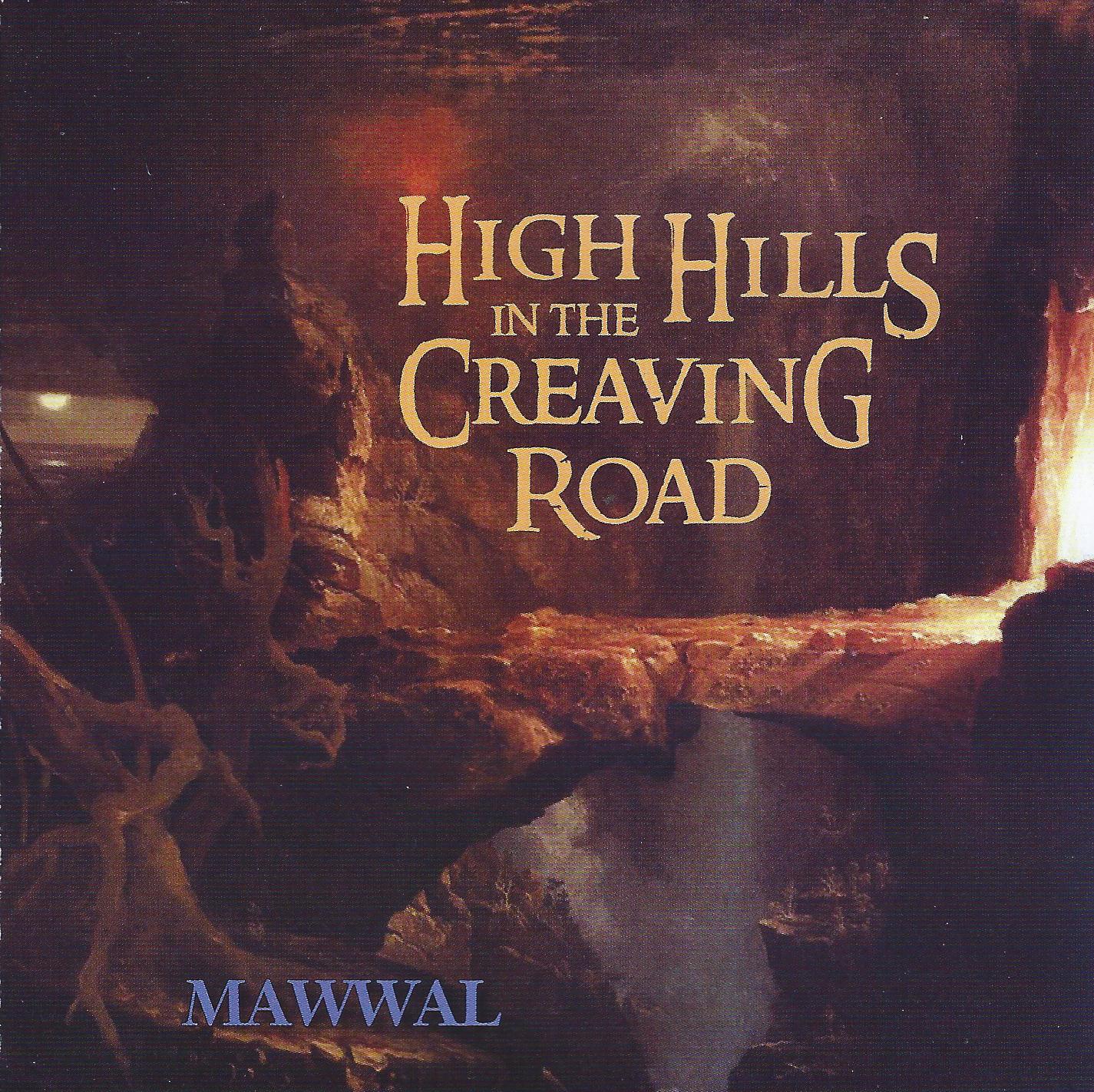 Massachusetts based musician and composer Jim Matus has released albums under several band names, the common thread being a focus on progressive world fusion. The 2001 released ISHQ album by Paranoise was my introduction to Jim’s music, followed by three Mawwal albums. Though familiar with them all, the new Mawwal album – High Hills in the Creaving Road – is the first of Jim’s music I’ve reviewed, and the first question that crossed my mind while listening was what the heck does “Mawwal” mean? Jim’s web site reveals that “Throughout the Middle East ‘Mawwal’ is a form of popular music that often criticizes society and is performed through improvisation.” CLICK HERE for a Wikipedia page with additional details.
Massachusetts based musician and composer Jim Matus has released albums under several band names, the common thread being a focus on progressive world fusion. The 2001 released ISHQ album by Paranoise was my introduction to Jim’s music, followed by three Mawwal albums. Though familiar with them all, the new Mawwal album – High Hills in the Creaving Road – is the first of Jim’s music I’ve reviewed, and the first question that crossed my mind while listening was what the heck does “Mawwal” mean? Jim’s web site reveals that “Throughout the Middle East ‘Mawwal’ is a form of popular music that often criticizes society and is performed through improvisation.” CLICK HERE for a Wikipedia page with additional details.
 King Kronos herald from Germany and can be loosely categorised as stoner rock, though they cover broader musical ground on Soundzilla. They are a five piece band featuring a female vocalist and a twin guitar attack that sets them apart from the more compact riffage of Acid King, the easiest band to directly compare them with. Be warned however, one false click on the internet will bring you face to face with a ginger-dreaded rapper operating out of the American Midwest under the same title!
King Kronos herald from Germany and can be loosely categorised as stoner rock, though they cover broader musical ground on Soundzilla. They are a five piece band featuring a female vocalist and a twin guitar attack that sets them apart from the more compact riffage of Acid King, the easiest band to directly compare them with. Be warned however, one false click on the internet will bring you face to face with a ginger-dreaded rapper operating out of the American Midwest under the same title!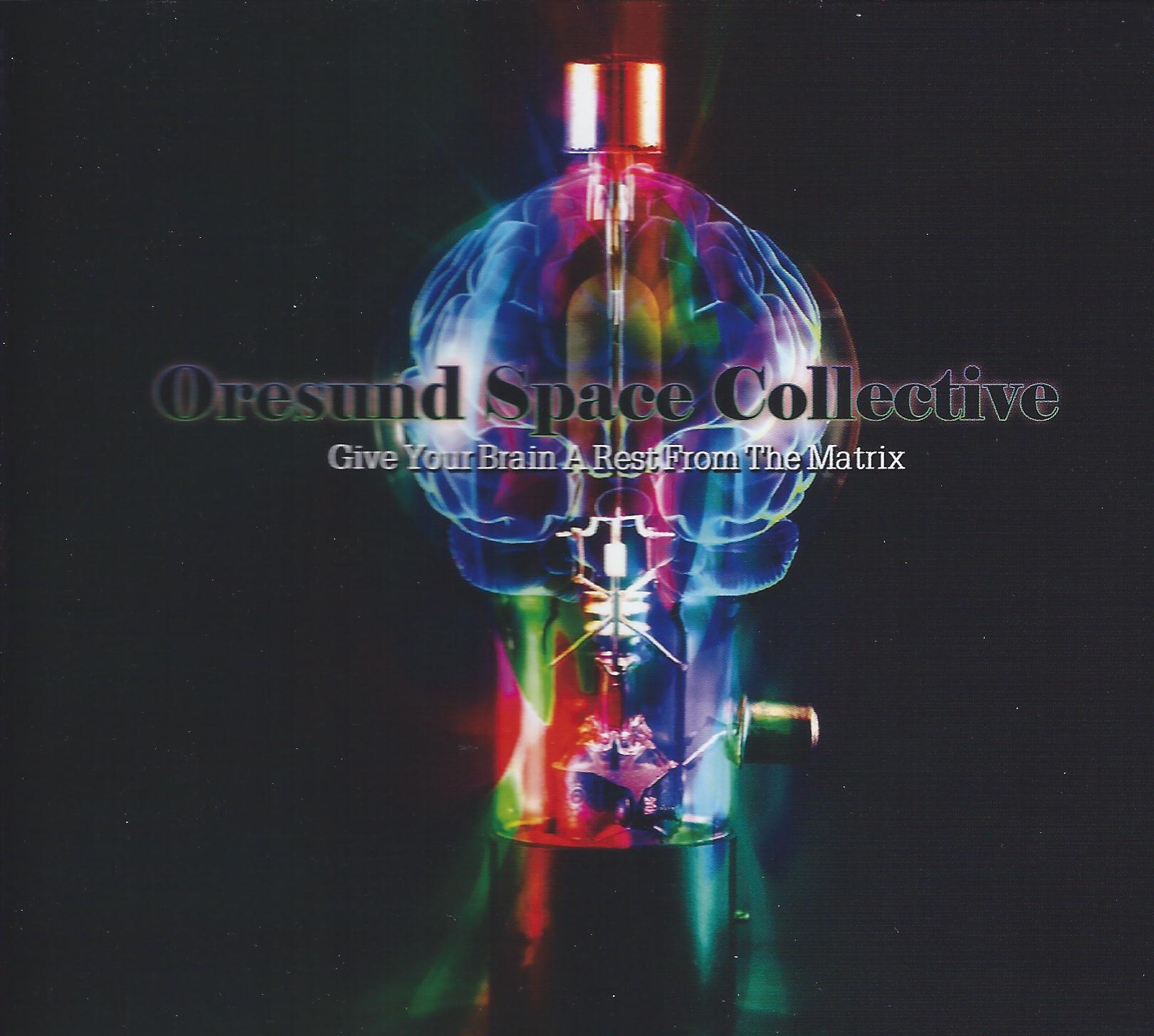 Since being formed by Dr. Space (aka Aural Innovations’ own Scott Heller) in 2004, Oresund Space Collective have been recording and touring at an amazing rate, with Give Your Brain a Rest from the Matrix being their 14th proper release, although the number of limited edition releases using one format only (such as the vinyl-only Entering the Space Country and Phaze Your Fears from 2011 and 2012 respectively) make it hard to keep track of just what is out there. This CD release (limited to 500 copies only, although possibly to be released as a double LP at some future point) was recorded at the same session – Sept 26th 2010 – that produced Space Country and Fears. To find another instance of just one single session producing enough material for three different albums, one would have to go back to the legendary Amon Duul session of 1968, which birthed several rather unlistenable albums. Fortunately, the four lengthy tracks on Give Your Brain a Rest from the Matrix contain far more musical depth than the acid-drenched communal noodlings of the original Amon Duul.
Since being formed by Dr. Space (aka Aural Innovations’ own Scott Heller) in 2004, Oresund Space Collective have been recording and touring at an amazing rate, with Give Your Brain a Rest from the Matrix being their 14th proper release, although the number of limited edition releases using one format only (such as the vinyl-only Entering the Space Country and Phaze Your Fears from 2011 and 2012 respectively) make it hard to keep track of just what is out there. This CD release (limited to 500 copies only, although possibly to be released as a double LP at some future point) was recorded at the same session – Sept 26th 2010 – that produced Space Country and Fears. To find another instance of just one single session producing enough material for three different albums, one would have to go back to the legendary Amon Duul session of 1968, which birthed several rather unlistenable albums. Fortunately, the four lengthy tracks on Give Your Brain a Rest from the Matrix contain far more musical depth than the acid-drenched communal noodlings of the original Amon Duul. Book Of Shadows – “Cosmos-Mother” (Instincto Records 212, INO-049)
Book Of Shadows – “Cosmos-Mother” (Instincto Records 212, INO-049)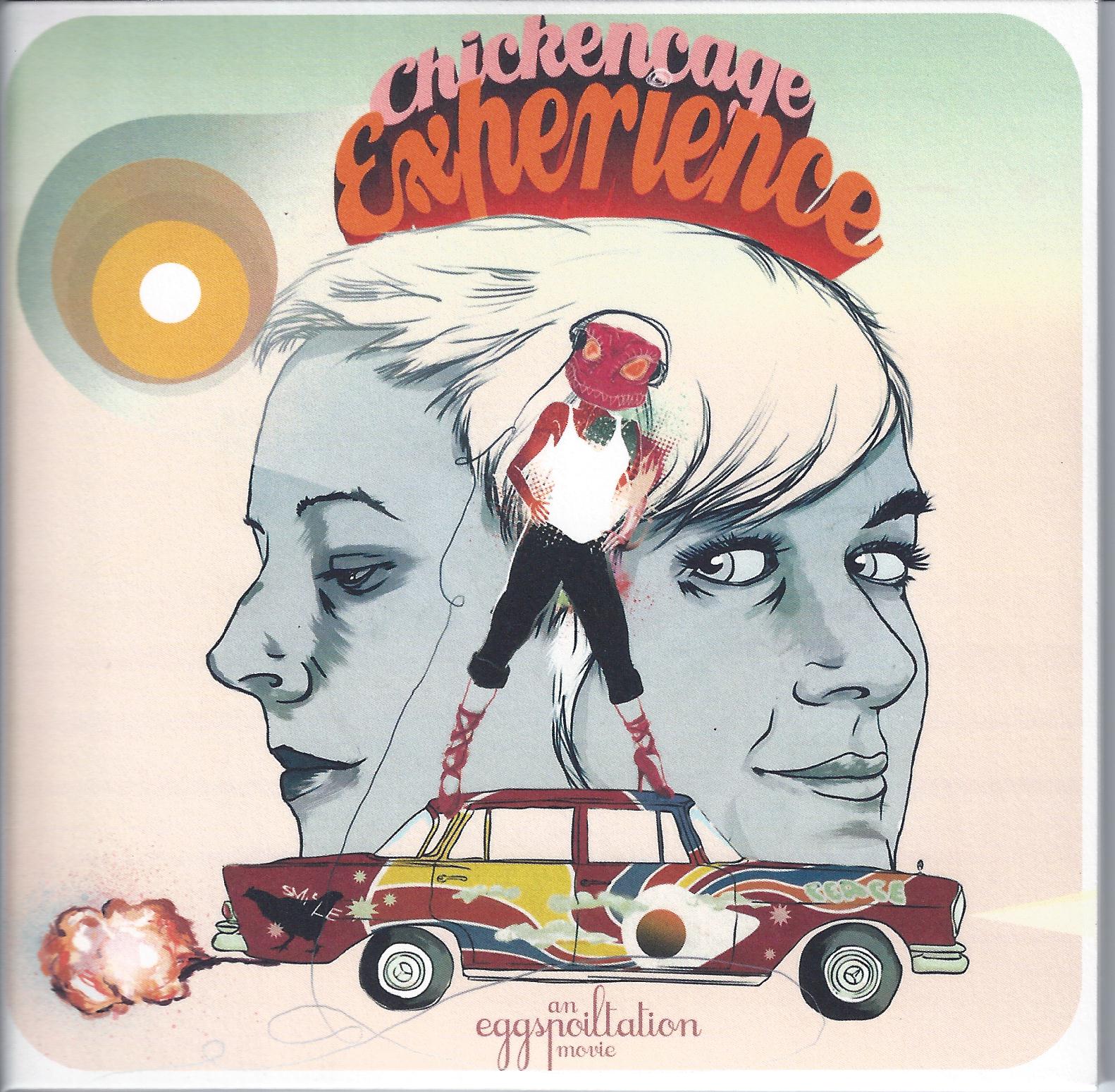 Chickencage Experience is a side project from the German band Polytoxicomane Philharmonie, or as the promo sheet states – “This is a collateral damage of the Polytoxicomane Philharmonie”. Titled An Eggspoiltation Movie, this is a CD (or 2-LP) + DVD movie set, with music that is by no means 360 degrees from Polytoxicomane Philharmonie.
Chickencage Experience is a side project from the German band Polytoxicomane Philharmonie, or as the promo sheet states – “This is a collateral damage of the Polytoxicomane Philharmonie”. Titled An Eggspoiltation Movie, this is a CD (or 2-LP) + DVD movie set, with music that is by no means 360 degrees from Polytoxicomane Philharmonie. The Cosmic Garden is the duo of Tibor Fredmann and Sigi Hümmer. Their debut full length CD (following the 2011 release of the EP Spirale), is a spaced out journey of improvised music. Between the two of them they play synths, Mellotron, acoustic and electric guitars, piano, strings, drums, percussion and voices.
The Cosmic Garden is the duo of Tibor Fredmann and Sigi Hümmer. Their debut full length CD (following the 2011 release of the EP Spirale), is a spaced out journey of improvised music. Between the two of them they play synths, Mellotron, acoustic and electric guitars, piano, strings, drums, percussion and voices.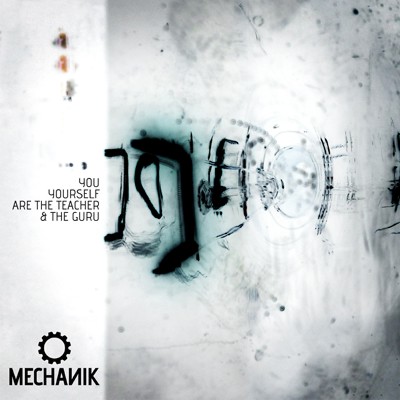 Hailing from Madrid, Spain, Mechanik’s brand of spacerock is more atmospheric than heavy, but it’s also refreshingly unique and innovative sounding. The 27-minute digital EP sent to us was You Yourself Are the Teacher & the Guru, but it left me so breathlessly wanting for more of their music, I visited their bandcamp.com site, and found they had released a second digital EP as well, and quickly downloaded that one too. Here’s a look at both of them.
Hailing from Madrid, Spain, Mechanik’s brand of spacerock is more atmospheric than heavy, but it’s also refreshingly unique and innovative sounding. The 27-minute digital EP sent to us was You Yourself Are the Teacher & the Guru, but it left me so breathlessly wanting for more of their music, I visited their bandcamp.com site, and found they had released a second digital EP as well, and quickly downloaded that one too. Here’s a look at both of them. With great anticipation, I moved onto Mechanik’s next EP, the 22-minute Inner Temple/Outer Temple. Mechanik’s music is infused with a sense of faraway mystery, and the opening track, Bliss & Gloss, is no exception. A little less intense than the music on the previous EP, but strangely seductive, this one is built around a laidback rhythm, with druggy, blissed out vocals and weird buzzing atmospherics swirling around it like alien insects on some extraterrestrial summer night. In fact, these guys are masters of atmosphere, building their layers of strange sound in complex and inventive ways. Bliss & Gloss comes to a close in weird and shadowy realms, not preparing us at all for what comes next. While the next track, Inner Temple, does start out with some weird electronic noodling and mellow acoustic guitar, without warning it breaks into a driving rocker. But these guys don’t follow any rules, so don’t expect anything typical here. Even the guitar solo towards the end of the song is a groaning, twisting, vaguely Middle Easterny thing that the guitarist sounds like he’s wrenching out of his instrument. It’s dazzlingly innovative and very cool. Final song, Did You Have to Take So Many Pills? is another up-tempo rocker, this one with a Krautrockish rhythm. And after the song proper part, this tune breaks out into a fiery spacerock jam to finish things off. Spectacular!
With great anticipation, I moved onto Mechanik’s next EP, the 22-minute Inner Temple/Outer Temple. Mechanik’s music is infused with a sense of faraway mystery, and the opening track, Bliss & Gloss, is no exception. A little less intense than the music on the previous EP, but strangely seductive, this one is built around a laidback rhythm, with druggy, blissed out vocals and weird buzzing atmospherics swirling around it like alien insects on some extraterrestrial summer night. In fact, these guys are masters of atmosphere, building their layers of strange sound in complex and inventive ways. Bliss & Gloss comes to a close in weird and shadowy realms, not preparing us at all for what comes next. While the next track, Inner Temple, does start out with some weird electronic noodling and mellow acoustic guitar, without warning it breaks into a driving rocker. But these guys don’t follow any rules, so don’t expect anything typical here. Even the guitar solo towards the end of the song is a groaning, twisting, vaguely Middle Easterny thing that the guitarist sounds like he’s wrenching out of his instrument. It’s dazzlingly innovative and very cool. Final song, Did You Have to Take So Many Pills? is another up-tempo rocker, this one with a Krautrockish rhythm. And after the song proper part, this tune breaks out into a fiery spacerock jam to finish things off. Spectacular!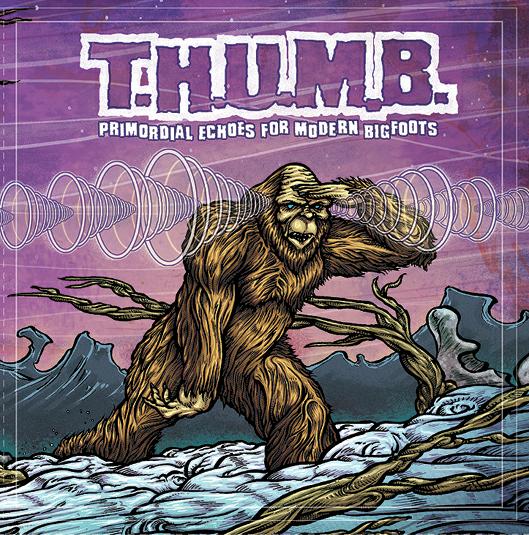 T.H.U.M.B. are an Italian Stoner-Psych trio who incorporate lots of spaced out effects into their songs. Primordial Echoes For Modern Bigfoots is the band’s first new release since 2004’s Lunar Flight EP.
T.H.U.M.B. are an Italian Stoner-Psych trio who incorporate lots of spaced out effects into their songs. Primordial Echoes For Modern Bigfoots is the band’s first new release since 2004’s Lunar Flight EP.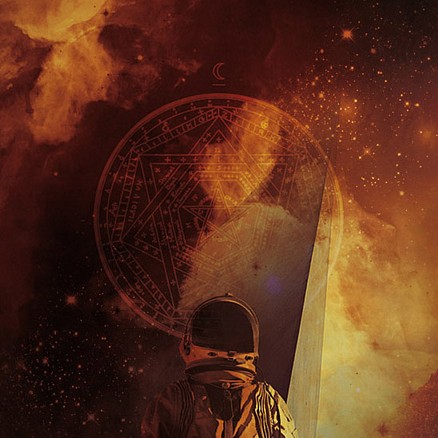 Pyramidal are a new spacerock band that hail from Alicante, Spain. And when I say spacerock, I mean SPACEROCK! These guys have it all, from the cosmic synths to the crunching guitar riffs to the touches of Middle Eastern modes. This is, indeed, spacerock in the purest sense. Mostly instrumental, there are only one or two tracks that have vocals, and those are very low in the mix. These guys are all about the music.
Pyramidal are a new spacerock band that hail from Alicante, Spain. And when I say spacerock, I mean SPACEROCK! These guys have it all, from the cosmic synths to the crunching guitar riffs to the touches of Middle Eastern modes. This is, indeed, spacerock in the purest sense. Mostly instrumental, there are only one or two tracks that have vocals, and those are very low in the mix. These guys are all about the music.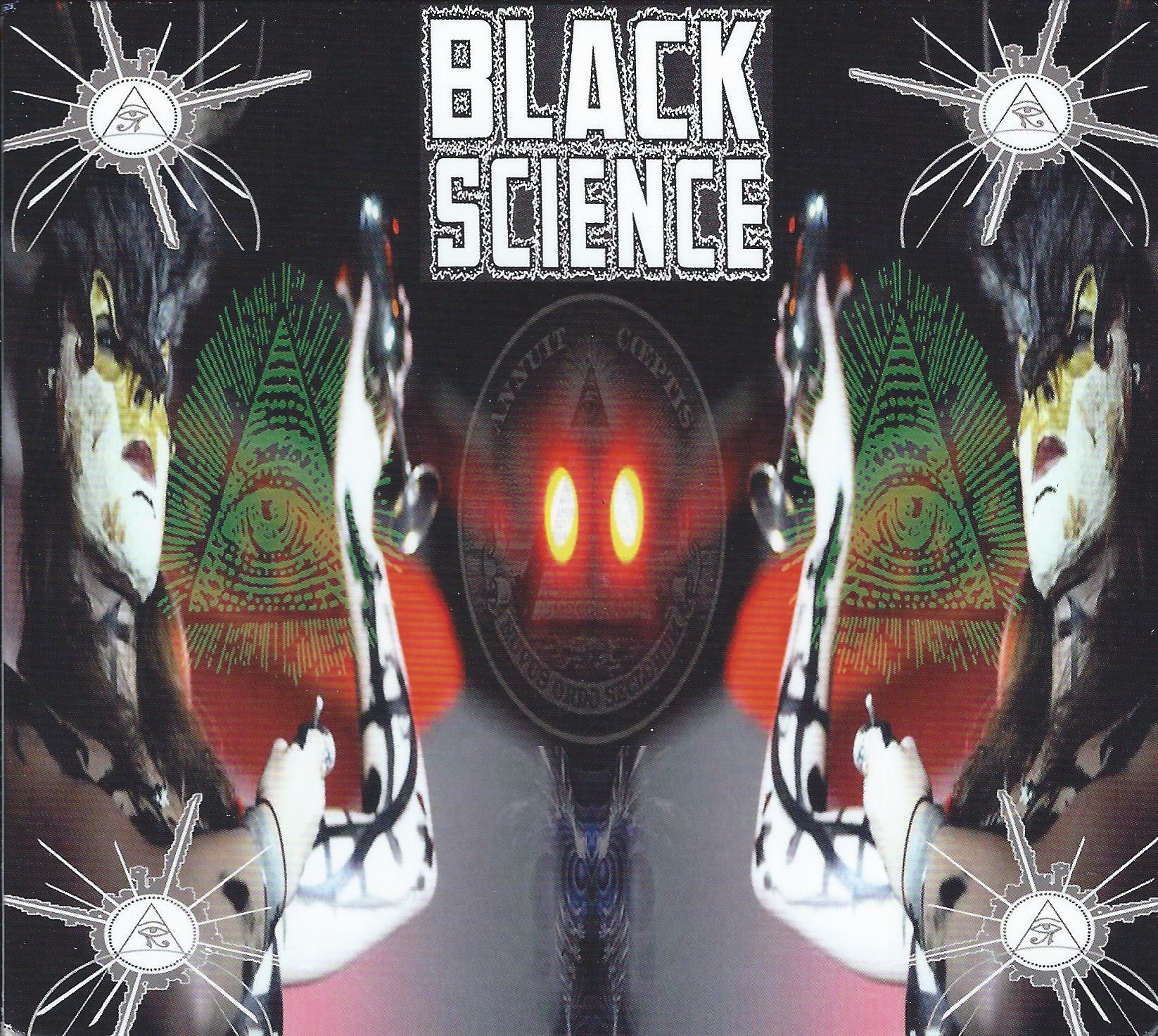 It’s always a welcome thing to hear new, modern, refreshingly original, balls to the wall psychedelic space rock. An Echo Through the Eyes of Forever is the third album from Seattle’s Black Science, and as far as that description in the previous sentence goes, it delivers in spades. It follow’s 2008’s A New Mastery of Light and 2010’s Cosmodemonic & Beyond, expanding on the ideas and sounds on those albums by pushing the envelope even further with some truly scorching music that takes the listener into the far flung realms of another dimension.
It’s always a welcome thing to hear new, modern, refreshingly original, balls to the wall psychedelic space rock. An Echo Through the Eyes of Forever is the third album from Seattle’s Black Science, and as far as that description in the previous sentence goes, it delivers in spades. It follow’s 2008’s A New Mastery of Light and 2010’s Cosmodemonic & Beyond, expanding on the ideas and sounds on those albums by pushing the envelope even further with some truly scorching music that takes the listener into the far flung realms of another dimension.